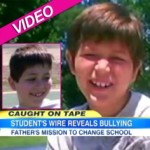
When we first imagine a new baby, we dream of a happy family life, full of friends and laughter. We look forward to cheering our children on as they grow and achieve. We don’t look forward to our children spending an isolated childhood in a segregated special education classroom. But as we come to terms with a child’s disability, we hope that somehow we can find communities that love and accept our children.
The recent viral video by father Stuart Chaifetz reveals an ugly side of special education. Mystified by behavior changes in his usually happy child with autism, Mr. Chaifetz sent his son to school with a tape recorder in his pocket. The YouTube video contains audio clips of school staff telling Akian to “knock it off” “shut your mouth” and “shut up you bastard”. When Akian asks for reassurance and is laughed at, he began screaming. Mr. Chaifetz describes a ½ hour long tantrum which followed, in which Akian knocked over chairs and hit teachers. The 4 million views of this video suggest that average folks find this tape shocking.
I wish I was shocked to hear this story, but I’ve heard and seen too much in 16 years raising a child with autism, and 10 years working with kids with autism. I have met many adults who cannot find a place in their hearts for children with autism. Our kids don’t always respond to people who try to be friendly, even by smiling or making eye contact. Whether kids are verbal or non-verbal, they lack basic people skills to connect with people. They have annoying personal habits like picking noses, and wiping mucous and spit in places they don’t belong. Their faces, hands and clothes are often smeared with remains of recent meals. Children with autism move in erratic, compulsive ways. Kids all over the autism spectrum know when the adults they interact with dislike them, although they usually don’t understand why. Akian had no way to know what “bastard” meant, but he understood the tone which said that he was unloved and unacceptable.
Parents of kids with autism know how people react when their child behaves oddly in public, perhaps making strange noises and strange movements. We are wounded by the stares and outright questions, and this becomes a barrier to bringing the child to the playground, grocery store, and to church. Parents yearn for a safe place where our children can play and learn and be accepted.
I’ve heard a teacher say that a child with autism just “didn’t belong” in her mainstream classroom, and I’ve battled with teachers who wanted to exclude children with autism from field trips for forgetting one too many homework assignments. I’ve heard about a principal berating a child with autism who made mistakes in the lunchroom, and seen kids with autism excluded from outdoor recess. I’ve seen kids restrained and secluded in time out rooms. I’ve heard many teachers ranting about parents and blaming them for the child’s behavior at school. I’ve also seen teachers who care go the extra mile to include kids with autism in marching band and musical plays and who find a way to make things work. I’ve been in schools that include non-verbal kids with autism in mainstream classrooms, because it is the right thing to do.
Imagine being a child with autism: you are the focus of the energy of so many loving adults who are trying to change you. Your basic self is not acceptable, and needs fixing. Imagine the perseverance needed to tolerate 500 repetitions needed to learn how to roll a ball, or to learn to point to a picture of an elephant . To tolerate having your behavior corrected, again, and again.

Pennsylvania has outlawed the use of prone restraints, possibly due to deaths of children, but this technique is still used in many states such as Minnesota. School personnel working with aggressive children usually receive training in safe crisis management which often including how to restrain safely.
Many idealistic young people want to work with special kids, but it is hard work, and sometimes boring and frustrating. Kids and parents are not always grateful, and when kids have increasing problem behaviors, it’s easier to blame the home environment rather than analyze one’s own actions. School staff need to follow through with mountains of small details like collecting data and following behavior plans, and must stay positive throughout contentious IEP meetings with argumentative parents. In the video, Akian’s dad implies that an Functional Behavior Assessment was done by a behaviorist and that a behavior plan was created. One assumes that the school staff received training during this process, but that these adults weren’t motivated to follow through with what they had learned.
Early in my experience as an “Autism Professional” I visited a school where many children were restrained in Rifton chairs for a good portion of the day. Staff wore black armguards to protect their arms from scratches and bites. I watched staff move two semi-circular tables around a child who was attempting to attack them. At this school, the teachers maintained quiet patience, despite reliance on antiquated methods of handling problem behaviors. I have seen many teachers with arms scarred by the fingernails of students with autism, who maintain a love for their students. Good quality behavioral intervention can sharply reduce high rates of problem behaviors, making the use of mechanical and physical restraints unnecessary. Ugly scenes of aggression and restraints motivated me to learn the skills needed to minimize physical control of kids, so we can all avoid the scars.

Mary and Dickon push Colin’s wheelchair into the secret garden, where he gains strength and secretly re-learns to walk .
One of my favorite childhood books is The Secret Garden by Frances Hodgson Burnett. Mary Lennox is a spoiled and sickly young British girl orphaned in colonial India who returns to England to live on the estate of her bitter widowed uncle. Mary, her cousin Colin, and her uncle regain health through the magic of growing flowers, animals, and fresh air in the garden.
The book Heidi follows a similar theme, as the invalid Clara is healed by fresh mountain air, goat’s milk, and the companionship of friends on a visit to the Swiss Alps. In these books, adults are not truly evil, but tend to stifle healthy growth through their anxious attentiveness to illness. Mary, Colin, and Clara have no real disabilities or illnesses. Out in nature and away from adults, the children challenge each other, and learn to run and play and help each other heal.
These powerful stories of healing feed my attraction to animal rescue and farm life. I don’t trust that people will be able to be kind, patient or including of speical children, so I gravitate to the acceptance of baby animals. Like many parents, I yearn for a positive nurturing environment, where all children can experience life without criticism and negativity.

Annie, a Good Shepherd resident with Spina Bifida, painting the barn at Flint Hill Farm. She says that people without the use of their legs can find plenty of work to do on the farm!
Last weekend at the farm, I heard a mother scolding her son “What are you doing, I told you to wash your hands, what are you, some kind of idiot, get going, wash them now…..” I was leading some disabled adults around the corner, and I paused at hearing the loud, ugly tone. I casually asked them to excuse us to make room for the wheelchair to pass by, hoping that might nudge them into some self-restraint.
Later I saw a mom with a son with Down syndrome, struggling to convince him to stop putting his hands in his mouth after interacting with goats. She didn’t raise her voice, although she was clearly stressed. I approached, wanting to distract him by letting him hold a chicken egg I’d just collected, and attempted to reassure the mom that it didn’t matter if the egg broke. Later, I realized that she probably feared contamination from the egg, as well. I was trying to distract him from putting his hands in his mouth in an accepting and positive way…..but perhaps I would have been more help by finding the hand sanitizer.
The contrast of the two situations stayed with me: the use of “idiot” as an insult to the son in the first, the self-conscious physical struggle of the second. Both moms were so fearful of contamination after contact with animals. I was sad that the worry created by dirt and germs blocked joy of contact with the natural world. It is certainly simplistic to hope that children, learning together about growing things, could somehow heal and grow straight and strong.
Parents of children with autism, like Mary’s uncle in the Secret Garden, have the potential to become bitter with grief. There is so much anger and pain in Mr. Chaifetz’s rant against his son’s cruel teachers. However, in a follow-up video, his voice is more hopeful when he speaks directly to his listeners and thanks them for their support and stories. In this fleeting moment of public attention, there is hope that people have gained a glimmer of understanding of what it might be like to be a powerless child with autism.


